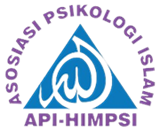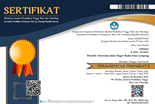Hubungan antara Psychological Well-Being dan Problematic Internet Use pada Emerging Adult
Abstract
Penelitian ini bertujuan untuk mengetahui hubungan psychological well-being dan problematic internet use pada emerging adult. Responden pada penelitian ini berjumlah 210 emerging adult di Jakarta dengan teknik pengambilan sampel convenience sampling. Psychological well-being diukur menggunakan Psychological Well-Being Scale (PWBS) yang dikembangkan oleh Ryff (1989). Problematic Internet Use diukur menggunakan Generalized Problematic Internet Use Scale 2 (GPIUS-2) yang dikembangkan oleh Caplan (2010). Data penelitian ini dianalisis dengan teknik korelasi sederhana. Berdasarkan hasil penelitian didapatkan hasil bahwa terdapat hubungan signifikan negatif antara semua dimensi psychological well-being (self-acceptance, positive relation with others, autonomy, environmental mastery, purpose in life, personal growth) dan problematic internet use.
Keywords
Full Text:
PDFReferences
Akin, A. (2012). The relationships between internet addiction, subjective vitality, and subjective happiness. CyberPsychology, Behavior, Social Networking, 15(8), 404-410.
Arnett, J. J. (2004). Emerging adulthood: The winding road from the late teens through the twenties. New York: Oxford University Press.
Arnett, J.J. (2006). Emerging adulthood in Europe: A response to Bynner. Journal of Youth Studies, 9(1), 111-123.
Arnett, J. J. (2012). New horizons in research on emerging and young adulthood. In A. Booth, S. L. Brown, N. S. Landale, W. D. Manning, & S. M. McHale (Eds.), Early adulthood in a family context. Springer: New York.
Arnett, J. J. (2013). The evidence for generation we and against generation me. Emerging Adulthood, 1(1), 5-10.
Asosiasi Penyedia Jasa Internet Indonesia (APJII). (2015). Profil pengguna internet Indonesia 2014. Jakarta: Puskakom UI.
Bernal-Ruiz, C., Rosa-Alcázar, A. I., González-Calatayud, V., & Rosa-Alcázar, E. (2017). Is there a relationship between problematic internet use and responses of social anxiety, obsessive- compulsive and psychological well-being among adolescents?. Anales de Psicologia, 33(2), 269- 276.
Cao, H., Sun, Y., Wan, Y., Hao, J., & Tao, F. (2011). Problematic internet use in Chinese adolescents and its relation to psychomatic symptoms and life satisfaction. BMC Public Health, 11(1), 1-8.
Caplan, S. E. (2003). Preference for online social interaction. Communication Research, 30(6), 625- 648.
Caplan, S. E. (2007). Relations among loneliness, social anxiety, and problematic internet use. CyberPsychology & Behavior, 10(2), 234-242
Caplan, S. E. (2010). Theory and measurement of generalized problematic Internet use: A two-step approach. Computers in Human Behavior, 26(5), 1089-1097.
Caplan, S. E., & High, A. C. (2011). Online social interaction, psychosocial well-being, and problematic Internet use. In K. S. Young & C. N. de Abreu (Eds.), Internet addiction: A handbook and guide to evaluation and treatment (35–53). John Wiley & Sons Inc.
Caplan, S. E., Williams, D., & Yee, N. (2009). Problematic internet use and psychosocial well-being among mmo players. Journal of Computers in Human Behavior, 25(6), 1312-1319.
Çardak, M. (2013). Psychological well-being and internet addiction among university students. The Turkish Online Journal of Educational Technologi, 12(3), 134-141.
Dutta, O., & Chye, S, Y. L. (2017). Internet use and psychological wellbeing: A study of international students in Singapore. Journal of International Students, 7(3), 825-840.
Gravetter, F. J. (2014). Statistic for behavioral science (Ed. 8th). Jakarta: Humanika.
Green, M. C., Hilken, J., Friedman, H., Grossman, K., Gasiewskj, j., Adler, R., & Sabini, J. (2005). Communication via instant messenger: short-and long-term effects. Journal of Applied Social Psychology, 35(3), 445-462.
Griffiths, M. D. (1998). Internet addiction: does it really exist? In J. Gakenbach(ed.), Psychology and the Internet. New York: Academic Press, 61-75.
Huang, C. (2017). Time spent on social network sites and psychological well-being: a meta-analysis.
CyberPsychology, Behavior, and Social Networking, 20(6), 346-354.
Keyes, C. L. M., Shmotkin, D., & Ryff, C. D. (2002). Optimizing well-being: the empirical encounter of two traditions. Journal of Personality and Social Psychology, 82(6), 1007-1022
Ko, C. H., Yen, J. Y., Chen, C. S., Yeh, Y. C. & Yen, C. F. (2009). Predictive of psychiatric symptoms for internet addiction in adolescents. Archives of Pediatrics & Adolescent Medicine, 163(10), 937-943.
Lin, L. Y., Sidani, J. E., Shensa, A., Radovic, A., Miller, E., Colditz, J. B., Hoffman, B. L., Giles, L. M., & Primack, B. A. (2016). Association between social media use and depression among U. S. young adults. Depression and Anxiety, 33, 323-331.
Milani, L., Osualdella, D., & Blasio, P. D. (2009). Quality of interpersonal relationships and problematic internet use in adolescence. CyberPsychology & Behavior, 12(6), 681-684.
Novianty, D. (2019). Pengguna Internet Indonesia Tahun 2018 Tembus 171 Juta. Diakses dari https://www.suara.com/tekno/2019/05/16/093655/pengguna-internet-indonesia-tahun-2018- tembus-171-juta-jiwa
Odaci, H., & Kalkan, M. (2010). Problematic internet use, loneliness and dating anxiety among young adult university students. Computers & Education, 55(3), 1091-1097.
Pal, D. (2017). Relationship between problematic internet use and psychological well-being among adolescents in Sweden. Lunds Universitet: Department of Psychology.
Prizant-Passal, S., Shechner, T., & Aderka, I. M. (2016). Social anxiety and internet use – A meta analysis: What do we know? What are we missing?. Computers in Human Behavior, 62, 221- 229.
Ryff, C. D. (1989). Happiness is everything, or is it? Explorations on the meaning of psychological well-being. Journal of Personality and Social Psychology, 57(6), 1069-1081.
Ryff, C. D. (1995). Psychological well-being in adult life. Current Directions in Psychological Science, 4(4), 99-104.
Ryff, C. D. & Singer, B. (1996). Pychological well-being: meaning, measurement, and implications for psychotherapy research. Pychoter Psychosom, 65, 14-23.
Sekaran, U. (2006). Metode penelitian untuk bisnis 1. (4th ed). Jakarta: Salemba Empat.
Shakya, H. B., & Christakis, N. A. (2017). Association of facebook use with compromised well-being: a longitudinal study. American Journal of Epidemiology, 185(3), 203-211.
Shapira, N. A., Lessig, M. C., Goldsmith, T. D., Szabo, S. T., Lazoritz, M., Gold, M. S., & Stein, D. J. (2003). Problematic internet use: proposed classification and diagnostic criteria. Depression and Anxiety, 17(4), 207-216.
Sharma, A., & Sharma, C. (2018). Internet addiction and psychological well-being among college students. Journal of Family Medicine and Primary Care, 7(1), 147-151.
Stepanikova, I., Nie, N. H., & He, X. (2010). Time on the internet at home, loneliness, and life satisfaction: Evidence from panel time-diary data. Computers in Human Behavior, 26(3), 329- 338.
Weiser, E. B. (2001). The functions of internet use and their social and psychological consequences. CyberPsychology & Behavior, 4(6), 723-743.
Young, K. S. (1996). Internet addiction: the emergence of a new clinical disorder. Poster presented at the 104th Annual Convention of the American Psychological Association in Toronto, Canada.
Young, K. S. & Rodgers, R. C. (1998). The relationship between depression and internet addiction. CyberPsychology & Behavior, 1(1), 25-28.
DOI: http://dx.doi.org/10.24042/ajp.v3i1.6116
Refbacks
- There are currently no refbacks.
Copyright (c) 2020 ANFUSINA: Journal of Psychology











